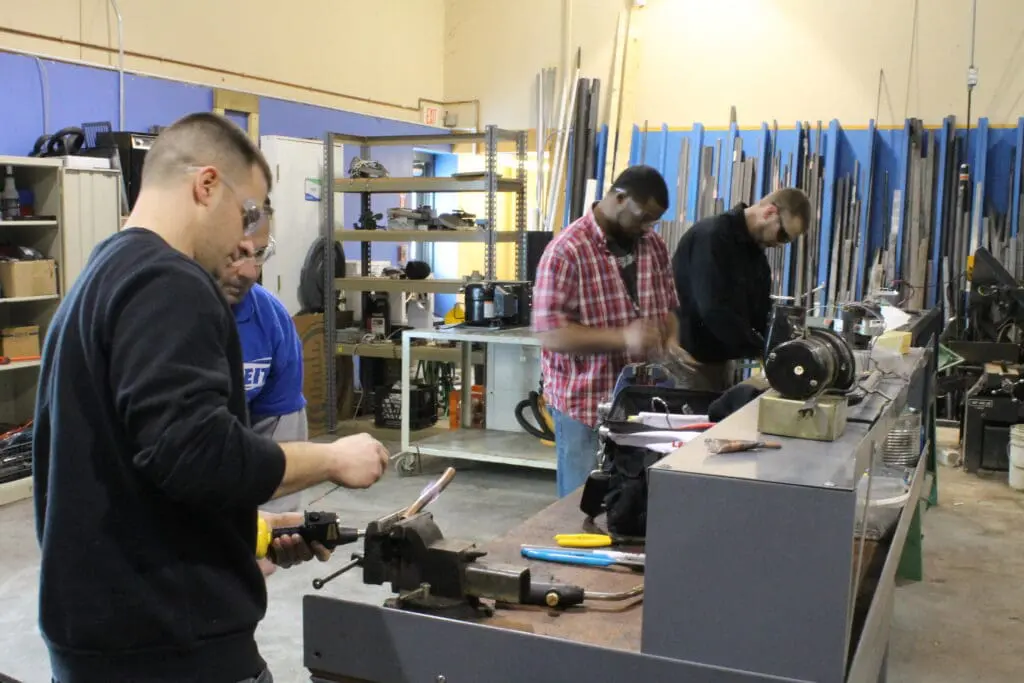Students building a bridge between academia and their career often face a difficult choice: trade school or traditional college? Depending on where you see yourself professionally, trade schools are a sensible choice, providing job-focused, hands-on curricula in a variety of in-demand or technical fields. Additionally, trade school programs can be completed in less than four years with lower tuition rates, making them especially beneficial when time or money is a concern.
In this article, we’ll provide answers to the most common questions students have when choosing between trade schooling or other professional development options. Is trade school right for you? Keep reading to find out.
What is Trade School?
Sometimes called vocational or technical schools, trade schools are educational institutions that provide dedicated training towards specific occupations, or trades. Trade school programs generally last anywhere between eight months and two years, while some can be completed sooner. Because of this, trade students are well-positioned to jumpstart their careers or pursue post-secondary education depending on their requirements.
How is Trade School Different From College?
Unlike colleges, trade schools omit liberal arts or general education courses. Because trade programs are highly specialized, they instead provide focused training and personalized career development, usually in intimate or hands-on settings as opposed to large lecture halls.
Some of the other ways your trade school experience might differ from the traditional college experience include:
Lower Tuition Rates
Trade school students typically graduate with significantly less debt than their four-year college counterparts. While college tuition continues to rise, trade schools remain a reliable and affordable option for career-focused education, often priced at a fraction of what you’d pay for a bachelor’s degree.
Quicker Entry Into the Workforce
While college students spend four or more years in school, trade programs fast-track careers by providing focused training in two years or less. Many programs include built-in internships or apprenticeships, allowing you to earn money as you gain real-world experience — all before graduation.
Greater Job Security
Trade careers often prove more recession-proof than many college-based positions. Essential services like electrical work, plumbing, and HVAC maintenance remain in demand regardless of economic conditions. Plus, these skills can’t be outsourced or easily replaced by automation, providing long-term career stability.
Class Size
Unlike large college lecture halls with hundreds of students, trade school classes typically maintain small groups of 15-20 students. This intimate learning environment ensures you get the individual attention needed to master complex technical skills.
Student-Instructor Relationships
Trade school instructors often bring years of industry experience with them into the classroom. The combination of small class sizes and hands-on training allows students to develop meaningful mentorship relationships with their instructors, who can provide valuable career guidance and professional connections.
Average Salaries: Trade School Jobs vs. College-Based Jobs
While college graduates may have higher earning potential in the long run, particularly in management or business major positions, trade school graduates can achieve competitive salaries much sooner. Trade professionals often start earning good wages immediately after graduation, while avoiding the significant student loan debt that can burden college graduates for decades. Skilled trades also offer clear paths for advancement through certification and specialization.

How is Trade School Different From College
What Can You Anticipate When Joining a Trade School?
- Hands-on learning
Instead of lectures, expect learning time to include practical, hands-on experience with industry-standard equipment and tools. - Career-focused curriculum
Every class you take is directly related to your chosen trade, eliminating general education requirements found in traditional college programs. - Smaller class sizes
Trade schools typically maintain intimate class sizes of 15-20 students, creating space for personalized attention from instructors. - Faster completion time
Most trade programs can be completed in 6-24 months, allowing you to enter the workforce much faster than a traditional four-year degree. - Career-focused advice
Instructors with real industry experience provide targeted guidance specific to your chosen trade field. - Limited student support
Unlike large universities with extensive student services, trade schools typically offer basic academic support focused primarily on technical training. - Limited extracurricular activities
Trade schools prioritize career preparation over campus life, so you’ll find fewer social clubs and activities compared to traditional colleges. - Accreditation
Choosing an accredited trade school is crucial for accessing federal financial aid and ensuring your education meets industry standards. - Transferable credits
Before enrolling, verify whether your trade school credits will transfer to other institutions if you plan to pursue further education later.
How Can I Succeed in my Trade Program?
- Stay curious and engaged
Don’t be afraid to ask questions and participate in the classwork as much as possible. - Be proactive
Apply for internships or apprenticeships to gain practical, real-world experience. - Network, network, network
Spend time getting to know your instructors and fellow students, as you never know where these valuable connections can lead. - Be resourceful
Take advantage of any career preparation services available — including interview practice workshops and resume-building assistance.
Start Your Career in In-Demand Industry
Skilled tradespeople will always be in demand. The Erie Institute of Technology is where they’re formed.
The Erie Institute of Technology provides the skills and knowledge aspiring professionals can use to get started in a variety of in-demand fields including welding, HVAC, computer & design, and manufacturing. Whether you’re a recent high school graduate or a working professional seeking to advance your career, the Erie Institute of Technology offers a transformative educational experience developed to launch you into a successful technical career. Located in Erie, PA, we provide convenient access for students across Pennsylvania, New York, and Ohio.
At EIT, we’re more than just a school — we’re your partner in professional development. Our specialized programs are crafted to meet the demands of today’s rapidly evolving job market. We pride ourselves on providing:
- Cutting-edge curricula that align with industry needs
- Hands-on laboratory training that goes beyond textbook learning
- Job placement assistance to help you launch your career
- Accredited financial aid
- A supportive, small-town environment that fosters personal and professional growth
Our commitment is simple: to provide you with the practical skills, industry-relevant knowledge, and professional support needed to succeed in your chosen field. At the Erie Institute of Technology, we don’t just educate — we empower you to build the future you’ve always imagined.
Jumpstart your career with valuable trade school experience at EIT. Explore our programs, schedule a campus tour, and discover why Erie Institute of Technology is the smart choice for your technical education.
About Author:

Ross Aresco
CFO
Ross Aresco is the CFO of Erie Institute of Technology. Erie Institute of Technology (EIT) is an Erie Pennsylvania technical/trade school providing training programs for medical, computer, electronics, manufacturing, and technology careers. EIT offers programs in many different areas to suit your interests and talents.
